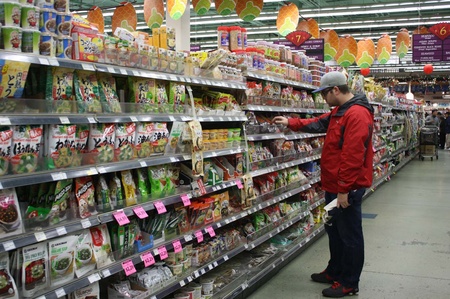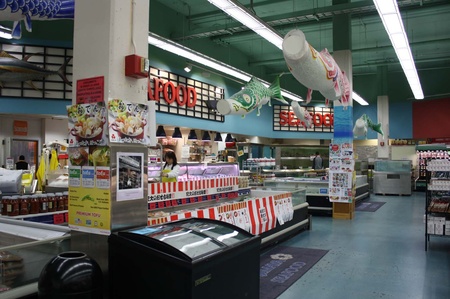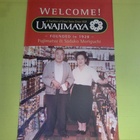There is no Japanese or Japanese-American living in Seattle who doesn't know the name "Uwajimaya." Even among non-Japanese Americans, the store is well-known in Seattle, where many different races live.
Since the 1970s, tofu has become popular in the United States due to the health boom, and at the same time interest in Japanese food, including sushi, has gradually increased. As a result, basic foods such as rice and soy sauce are now available at many supermarkets.
However, when it comes to a wide selection, you have no choice but to go to a store that mainly sells Japanese food. In Seattle, a little way from downtown, there are stores that sell Japanese food and ingredients such as Maruta Shoten, as well as many stores that stock not only Japanese but also other Asian ingredients.
Among them, Uwajimaya, located in a corner of the bustling downtown area known as the International District, stands out for its product lineup. It is within walking distance of the bustling downtown, close to the King Street station of the long-distance Amtrak train line, and close to Safeco Field, home of the major league baseball team, the Seattle Mariners.
The building that houses Uwajimaya (Uwajimaya Village) has a beige exterior with a soft pink tinge, a vibrant blue tiled roof on the front, and the words "Uwajimaya Asian Food & Gift Market" can be seen above it. The storefront is sometimes equipped with stalls selling Tianjin sweet chestnuts, giving it a Japanese feel. There are many stores and restaurants in the area, and many people use Uwajimaya's parking lot while shopping in search of parking spaces, so the area is bustling with cars coming and going constantly, especially at the end of the year.
"Bontan Ame" in a prominent place
Currently, Uwajiamaya has stores in Seattle, Bellevue, a town near Seattle where many Japanese expatriates live, and Renton, Washington State. It also opened a store in Beaverton, Oregon, to the south, in 1998 in partnership with Kinokuniya Bookstore.
The Seattle store, which is the core of the company, has a floor space of about 3,250 square meters (985 tsubo), which is slightly smaller than 60 meters squared. In Japan, it feels like a sales floor of a general merchandise store (GMS).
The store carries all the food you would find in a regular supermarket, including fresh meat, vegetables, and fish, as well as processed foods, but what sets it apart is the selection of products from Asian countries such as Japan, China, Korea, Vietnam, Thailand, Indonesia, and the Philippines. Most items are available, including soba and udon noodles, instant miso soup, and snacks.

What's interesting is that, among the Japanese sweets, they stock the traditional "Botan Ame rice candy" as one of their representative products (as stated on their website), giving it a uniquely Japanese feel. Sometimes Japanese things found overseas are more Japanese than they are in Japan, and this is one such example.
You can also order New Year's dishes.
In recent years, sake (Sake) has become popular around the world. Japanese supermarkets overseas are also stocking a wide variety of sake. Uwajimaya also has a wide variety, with shelves lined with local sake brands from all over Japan, as well as wine and beer. When American customers who are interested in Japanese cuisine buy ingredients to try cooking on their own but don't know what to use or how to cook, the staff in the store are happy to give them advice.
In the meat section, there are products that are common in Japan but not found in the average American supermarket.
"They had thinly sliced meat in packs, which was very convenient for making sukiyaki, so I often bought it."
"I was surprised at how well the meat was cut to order," said a Japanese woman who had lived in Seattle for many years and returned to Japan last year.
The New Year is just around the corner, and at the end of the year, Osechi Ryori will be on display, and orders for "Jubako" (tiered boxes) will also be accepted. It is sold for $59.95 as "Osechi Ryori - Japanese New Year Good Luck Food," which includes black beans and Datemaki. When New Year comes, the interior of the store will also be decorated in a Japanese New Year atmosphere.

© 2017 Ryusuke Kawai






